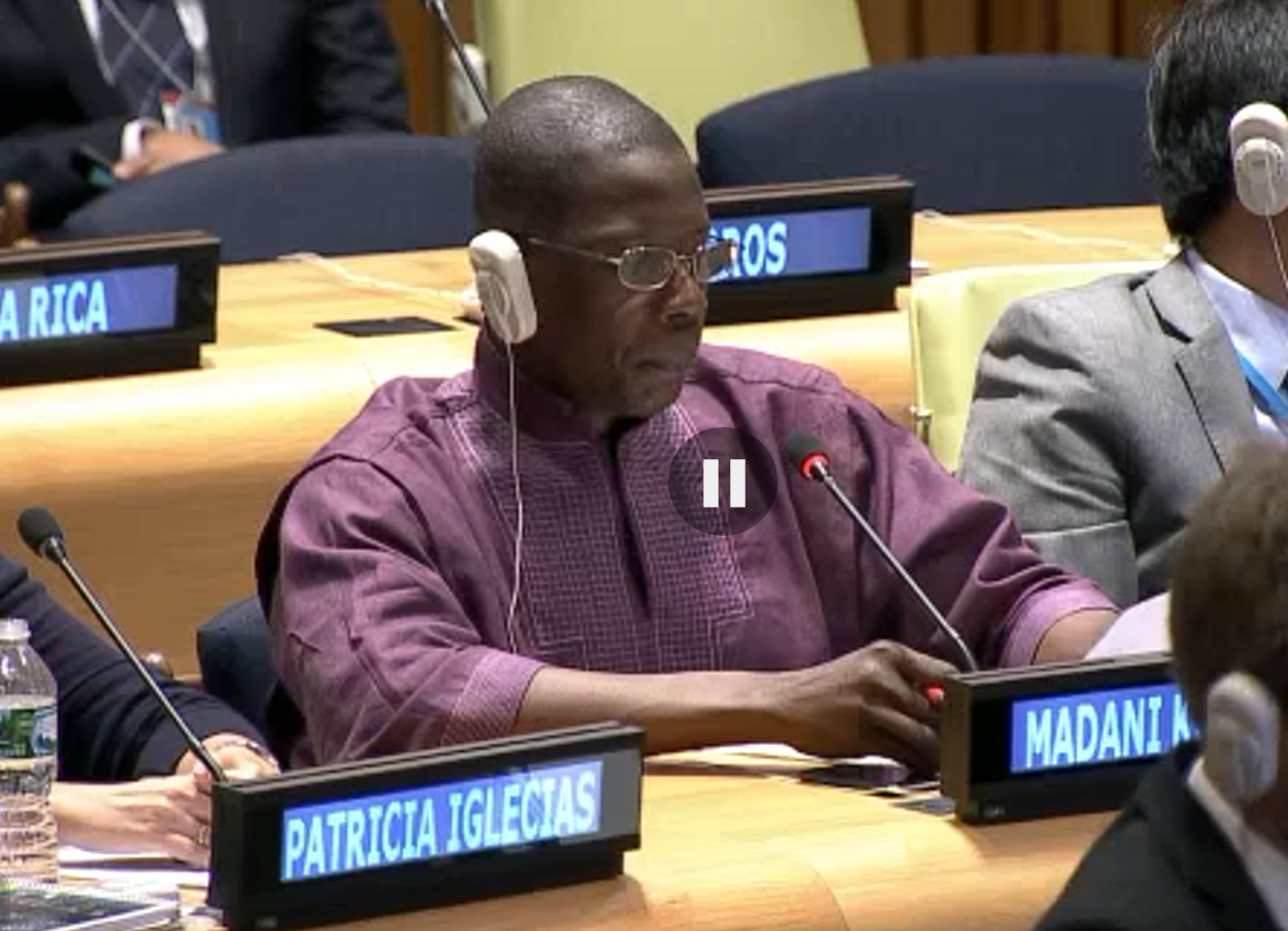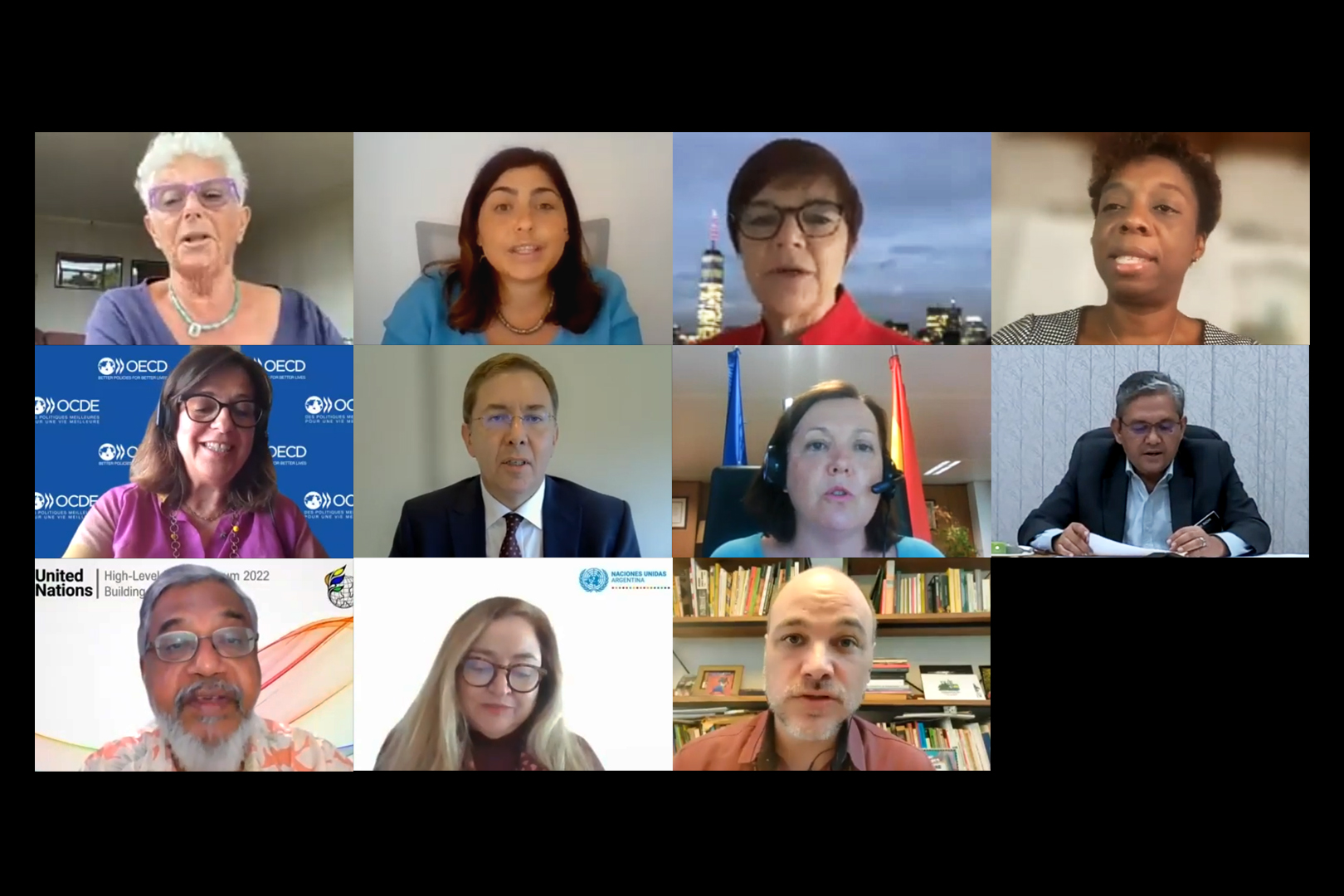RIPESS’ contribution to the long road to success.
Yvon Poirier // 18 april 2023
Today’s adoption by the United Nations General Assembly of resolution A/RES/77/281 is a very significant achievement for our movement that has promoted SSE as an important paradigm change to help humanity to move towards genuinely sustainable development that leaves no one behind, the rallying cry of Agenda 2030.
We would like to express our heartfelt thanks and commend Argentina, Armenia, Belgium, Bulgaria, Canada, Chile, Colombia, Costa Rica, Croatia, Czechia, Denmark, Dominican Republic, Equatorial Guinea, Finland, Estonia, France, Germany, Greece, Hungary, Italy, Luxembourg, Malta, Mongolia, Morocco, Portugal, Romania, Senegal, Slovenia, and Spain for co-sponsoring this resolution. We are particularly grateful to Chili, Senegal, and Spain, supported by France, for establishing a zero draft of the resolution and organising the necessary negotiations that resulted in a final draft on which consensus was reached on March 23rd.
RIPESS has promoted the inclusion of SSE in sustainable development since the RIO+20 global summit of June 2012. We already at that date presented specific proposals for the inclusion of SSE in the future 2015-2030 SDG’s. We were aware that the 2000-2015 Millennium Development Goals (MDGs) were not reducing poverty significantly, and that many of the Goals would not be achieved.
This is why we actively participated in all arenas where it was possible to promote SSE in the 2012-2014 period, as we knew that the 2015-2030 SDGs would not be achieved through the business-as-usual approach. We participated in civil society consultations that recommended the recognition of SSE. We participated in the 2013 and 2014 HLPF events in New York. During the 2014 HLPF, our then-Executive Secretary, Daniel Tygel was the official spokesperson for civil society, taking the floor in front of 130 country delegations. We also published a series of recommendations at this time; they had been endorsed by 500 organisations from all around the world.
Even if we failed to get SSE included in Agenda 2030, we relentlessly pursued the path of international recognition for SSE. Our colleague from Mali in Africa, Madani Coumaré was chosen as a civil society speaker at the occasion of one of the interactive dialogues during the UN Summit that adopted Agenda 2030 in September 2015.
Our members continued to work in their respective countries and continents. At the global level, we continued by firmly committing to the United Nations Inter-Agency Task Force on SSE (UNTFSSE) that was established in 2013. We continued to participate in the ILO SSE yearly SSE Academies. We organised (generally co-organised) workshops in many official gatherings such as UNCTAD 14 in Nairobi in 2016, and UN Habitat III held in Mexico and the adoption of the New Urban Agenda in Quito in 2016. The UN Habitat III consultations was the occasion to co-organise workshops during the preparatory consultations in Montreal, Monterrey, and Barcelona, jointly with other SSE organisations. SSE was included in the reports of the three meetings. We also co-signed with other SSE organizations: SSE IF, INAISE, GSEF, FMDV and Habitat International Coalition proposing the inclusion of SSE in the New Urban Agenda (NUA). The months of effort were a success and SSE was included. Since then, the UN General Assembly adopted a resolution in December 2016 endorsing the NUA. This was the first UN Resolution to mention SSE.
September 7th, 2016 was the moment when the process towards a UN resolution truly began. Even if it was in the back of our minds, a message was forwarded to us by a UN Civil servant on that day that suggested that the moment would be ripe for proposing a resolution on SSE. Realising that we had made considerable progress in terms of international recognition for SSE, the idea was shared with the UNTFSSE in the following weeks and months. The idea was carried forward in a couple of meetings in 2017, and finally, on February 24th 2018, the UNTFSSE adopted a first concept note and endorsed the proposal to move in that direction. It had now become an official endeavour. The authors of the first concept note, Chantal Line Carpentier and Fulvia Farinelli from UNCTAD (a member of the UNTFSSE) accompanied by the author of this article, were asked to continue the work and prepare a first draft of the future resolution. In early January 2019, based on content provided by this author, Raymond Landveld shaped the draft so it read in a more typical UN Resolution format. That first draft was shared and adopted in the February 26th 2019 Task Force meeting. A second draft, with a few amendments was adopted in May, following suggestions by members and observers.
At that point in time, no country was prepared to sponsor/propose such a resolution. A decision was made to put any future work on improving the draft resolution on hold, with the logic that at a future date, when countries agreed to sponsor the resolution, the work on the draft would then be taken up again.
From May 2019 to April 2022, the focus was on identifying a country group of countries prepared to sponsor the resolution. To this end, a rationale was produced in different languages. Members and observers of the UNTFSSE, including RIPESS, promoted the importance of a resolution in many international events such as Pact for Impact in July 2019 in Paris, the virtual HLPF events, GSEF 2021 in Mexico, and many more. The COVID-19 pandemic considerably slowed the process.
In March 2021, the International Labor Organisation (ILO) Governing body decided that the theme for the General discussion for the 110th International Labor Conference (ILC) of June 2022 would be Decent work and the social and solidarity economy. Since all countries are members of the ILC, the preparatory documents, and the document adopted, raised awareness about SSE. The definition of SSE adopted at this occasion became the core definition of SSE in the Resolution. The ILO is the first UN Agency that formally endorses SSE. The results of the ILC were an important steppingstone to convince more countries to support the UN Resolution.
The breakthrough came in early 2022, when France and Spain held a meeting in Paris on April 20th – 21st, to discuss the concrete proposal of a resolution. The UNTFSSE was then asked to prepare an updated version of the draft, as three years had elapsed since the version of May 2019. The then-Chair, Vic van Vuuren, the team that had worked on this in the past, Raymond Landveld, Yvon Poirier (author of this article) and Valentina Verze from the ILO, collectively worked to support of the UNTFSSE and updated the document. This was achieved by some days of very intensive work, and the new version was submitted to a special meeting of the UNTFSSE held on April 8th.
The above-mentioned meeting hosted by France was successful, and the participants decided to propose the resolution for the upcoming 77th session of the United Nations General Assembly (September 2022 to September 2023). At the occasion of the 2022 HLPF, a successful webinar was organised by RIPESS and the UNTFSSE to promote SSE, including the upcoming resolution, on July 5th.
Two side events were held in 2022 to promote the effort within all permanent missions at the UN; the first was organized by Spain on July 22nd, and a second by France on December 13th. As a RIPESS representative, I was requested to act as moderator for the July 22 event, and as spokesperson for RIPESS in December. This process led to the formal engagement of 15-16 member countries. They jointly designated a core team to lead the process. Chili, Spain, and Senegal organised exchanges with the group of countries, and circulated with a zero draft on March 1st. Following this, the group of 3 co-facilitators organised rounds of consultations on the draft. After 3 weeks of negotiations, and with various changes to the draft, the proposed resolution went through a process called the “silence procedure”. Once this procedure was launched, Member States had 48 hours to break the silence (signal any disagreement). Since the silence procedure was not broken by the deadline of March 23rd, 5 PM, New York time, the resolution was considered validated for adoption by consensus at the UN General Assembly. This is the normal UN process. Once a resolution has been agreed, the next steps are translation in different UN languages, fixing a date to the adoption procedure, etc.
The adoption of the resolution is a very important step for SSE and SSE actors, but we must stay modest.
The challenges to fully include SSE in all aspects of development aimed at achieving the SDGs are enormous. We will need to deploy the SSE approach where it is still weak, or even unknown, and strengthen its capacity where it already exists. We will need to strengthen organisations and networks. The financial challenge will be huge, since the global financial system in which we are living does everything it can to limit funding to the corporate sector.
Raising hundreds of millions of people out of abject poverty can only be achieved by SSE. Governments need to adopt progressive taxation in “wealthy and developed” countries. And even in these countries, extreme poverty is fast increasing due to the current multiple crises. Tax havens need to be abolished. All countries need to adopt full social protection measures. SSE needs to be part of the effort to move away from the carbon economy. Local economies need to be strengthened. Abolishing poverty is not possible in a world where 1% of the population capture an estimated 63% of the wealth produced in 2021 and 2022. We must view SSE as a holistic approach that encompasses all sectors of economic life, as is the case for the SDGs. Everything is interconnected.
There is room for hope and optimism.
The adoption of the Resolution is the result of the SSE ecosystem we have collectively built over several decades. This ecosystem, composed of UN Agencies, the work on this subject by the OECD and UNCTAD, the UNTFSSE, SSE organisations (RIPESS, GSEF and others), States, research organisations such as CIRIEC and EMES, has gradually developed. Without this work, a UN SSE Resolution would simply NOT HAVE BEEN POSSIBLE!
We strongly suggest that the only way to overcome the enormous challenges we will continue to face, is to strengthen the cohesion and the ecosystemic approach of these last decades. Those who travel alone will not go far, but together we can achieve great advances in leaving no one behind.
RIPESS Intercontinental and its continental members are firmly committed to this approach. It has been part of our core mission since the beginning.
Solidarity is the key.






